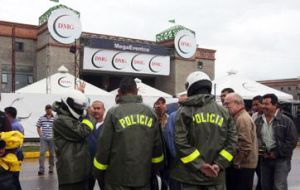MercoPress. South Atlantic News Agency
Financial pyramids force Colombia into state of emergency
 Authorities close DMG offices
Authorities close DMG offices Colombia, a country that has adjusted to living with four decades of guerrilla warfare and drug cartels declared a 30 day state of emergency Monday to crack down on illegal investment schemes that lured millions of people with promises of high payouts, only to collapse amid rioting.
Government officials vowed to repay the poorest investors and sent police to shut down other alleged pyramid scheme operations on Monday, even though some loyal clients marched through the streets to defend companies that had offered interest rates as high as 150% a month. "Citizens should understand that the government is protecting them" Interior Minister Fabio Valencia said as he announced the emergency measures. They include boosting prison terms for those who illegally collected money to 20 years from six, and giving mayors and governors police powers to shut down such businesses. Millions of Colombians had invested cash with unlicensed companies, and panic set in last week when one company, DRFE, collapsed amid news that its owner had left the country. Furious clients stormed and looted local branches in rioting that left 13 towns under police curfew and two men dead last week. Officials seized 92.4 billion pesos (42 million USD) from 68 of the company's offices and arrested 52 employees, police said. Pyramid schemes can offer dramatically high returns by using later investors' cash to pay off those who invest first. But they collapse when the flow of incoming money isn't enough to pay the growing pool of investors. On Monday, police occupied 59 offices of the largest such investment company, DMG, in 20 of Colombia's 32 states, national police Gen. Orlando Paez said. Federal financial regulator Hernando Ruiz said his office had found irregularities in DMG's balance sheets. Officials have said weak laws and legal manoeuvring kept them from stamping out the fast-growing schemes earlier. President Alvaro Uribe has expressed regret that authorities did not act sooner, and Colombia's top banking regulator resigned last week. Uribe vowed to help poor investors regain their savings, but said wealthier clients should have known better and will "have to take some blows to the chest." Finance Minister Oscar Ivan Zuluaga on Monday announced the government plans to repay investors' principal â€" though not interest. Money would go first to those who had contributed the least, in an effort to protect the small investors who are most likely to be poor.




Top Comments
Disclaimer & comment rulesCommenting for this story is now closed.
If you have a Facebook account, become a fan and comment on our Facebook Page!